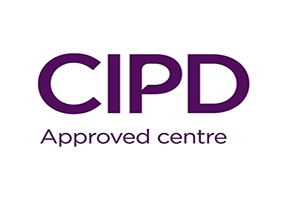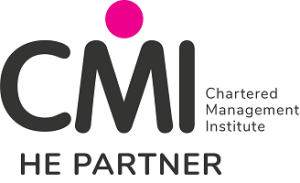
Key information
UCAS code:
NN16
Accreditation:
This course is Accredited
Typical offer:
112-120 UCAS points from 3 A levels, or equivalent
Clearing Hotline: 023 9284 8074
Showing content for section Overview
Overview
Apply now through Clearing
If you have your results, you can apply directly to us now to start in September 2024.
People are a vital business asset — and getting the human side of business right leads to a competitive advantage in industry.
This BA (Hons) Business and HRM degree prepares you for a successful career in human resources. As a human resources manager you'll formulate policies that address modern workplace issues like flexible working, remote working and equality and diversity, and lead on strategies to recruit and retain the right workforce.
Human resource management covers the strategic approach to the employment, development and wellbeing of people in business. On this degree you'll build your HRM knowledge and develop your understanding of human resources in the context of business, as well as discovering the core business disciplines that make organisations successful.
You’ll apply your learning through real-world scenarios and learning projects, with opportunities including paid industry placements throughout your studies. If you take on a Business Consultancy Project you'll work on a live client project with a local business in your final year.
By taking an industry placement year before or after your third year, you’ll graduate with a year of experience in the workplace as well as your degree. Our Placements team will support you during your placement search and while you’re on placement.
You'll graduate from this course with a head start in the job market, and be able to apply for Associate Membership of the Chartered Institute of Personnel and Development (CIPD) — something that is often only available after postgraduate study.
“Every part of the business boils down to people. And by managing people, organisations can be more profitable, lead more effectively, create brand loyalty and do better work.”
HRD Connect research
Course highlights
- Develop a holistic understanding of how businesses operate as you explore operations, business finance, marketing and data analysis alongside your human resource management modules
- Learn the human resource management skills you need in a post-Covid world, focusing on workforce retention and talent management, managing equality and diversity and developing creativity and business improvement
- Practise your skills by setting up recruitment campaigns and getting involved in simulated interviews, selection panels and employment tribunals
- Gain the confidence to lead as you apply your learning to real-world situations and take part in our Business Consultancy Project
- Be taught by a team of practitioners with entrepreneurial, academic and industry experience who are part of a dedicated Organisation Studies and Human Resource Management research group
- Benefit from an active programme of specialist and industry talks and networking events
- Boost your employability and increase your practical experience with a paid placement year at a company, and benefit from the support of our dedicated Placement Team during your placement search
Business and management studies at the University of Portsmouth is ranked 4th of the modern universities for research quality
Research Excellence Framework (REF) 2021
Accreditation
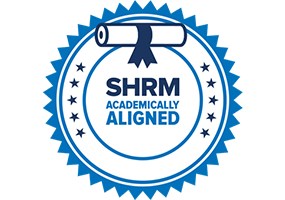
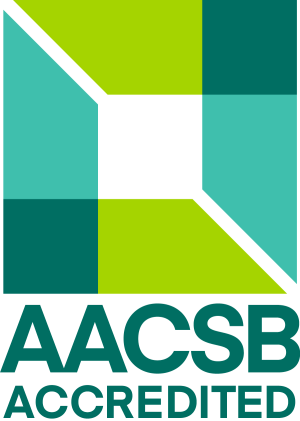
No. 3
influential business school in the world
Financial Times Teaching Power Rankings 2021
93%
overall student satisfaction for our BA (Hons) Business and Human Resource Management
(NSS, 2022)
Top 30
for student satisfaction
(Times Higher Education, 2024)
This course is aligned with the standards laid out in the Society for Human Resource Management (SHRM) curriculum. With over 300,000 HR and business executive members spanning 165 countries, SHRM is the largest human resource management association on the planet. This recognition confirms the high level of HR education we uphold, and our role as a springboard for exceptional human resource professionals.
This course is accredited by the Chartered Institute of Personnel and Development (CIPD).
On successful completion, providing students are in active CIPD membership, students will automatically gain Associate membership of the CIPD. They will then be able to use the designatory letters Assoc CIPD.
In addition to the above, we have partnered with the CMI so that you can gain a value added professional qualification alongside your degree. Students on our BA Business and Human Resource Management course can be awarded a CMI Level 5 Certificate in Management and Leadership upon successful completion of their degree programme. Upon joining their degree course, students become members of the CMI and are able to access a range of benefits, resources and events to support their professional development.
The University of Portsmouth has earned business accreditation from the AACSB in recognition of the outstanding quality of its business and management education. Less than six percent of the world's schools offering business degree programs hold AACSB business accreditation.

My course was CIPD accredited which was a real selling point. My course helped to provide me with the foundation knowledge of this and showed me different areas within my profession which I will plan my career around.
Contact information
Contact AdmissionsClearing Hotline: 023 9284 8074
Clearing is open
This course is available through Clearing.
Apply now through Clearing
If you have your results, you can apply directly to us now to start in September 2024.
Guaranteed accommodation

Connected Degrees®
Only at Portsmouth you have the choice to take a traditional sandwich placement before your third year, or to take your placement after your final year.
Upbeat music plays over information about Connected Degrees® from the University of Portsmouth.
Discover how Clearing works
Clearing 2024 opens on 5 July and closes on 21 October
Every year thousands of students find their ideal undergraduate course through Clearing. Clearing matches students who are looking for a different course or university from their original choice, or who are applying for the very first time after 30 June, to courses that universities still have places on.
The majority of people apply through Clearing once they receive their exam results on A level / T level results day (15 August 2024).
You can apply through Clearing if:
- You don't meet the conditions of your offer for your firm (first) or insurance (second) choice courses
- Your exam results are better than you expected and you want to change your course or university
- You don't hold any offers
- You've accepted an offer but changed your mind about the course you want to do
- You're applying for the first time after 30 June 2024
Yes, we welcome Clearing applications from international students and you can apply in exactly the same way as UK students do.
The majority of UK students apply through Clearing once they receive their A level / T level results in August 2024, so as an international student if you already have your exam results you can apply when Clearing opens.
Make sure that you have time to get your visa, funding, and English language certification sorted out before the beginning of term.
If you would like further information or guidance, please contact our international office for advice.
The entry requirements for courses can change in Clearing but if you want an idea of what grades we usually accept, take a look at our undergraduate course pages.
Even if you don't quite meet the entry requirements, we'd still encourage you to apply as you could still get a place.
Book your place at our Clearing visit day
Join us on campus Thursday 8 August, 10am-3pm
Yes, our four career-focused undergraduate courses at our growing London campus are available to apply for through Clearing.
Webinar: Applying to uni through Clearing
Yes, you can join our webinar on Tue, Aug 6, 2024 4:00 PM - 5:00 PM BST and we'll tell you all about the Clearing process.
Clearing Hotline: 023 9284 8074
Entry requirements
BA (Hons) Business and Human Resource Management degree entry requirements
Typical offers
- A levels - BBB-BBC
- UCAS points - 112-120 points from 3 A levels, or equivalent (calculate your UCAS points)
- T-levels - Merit
- BTECs (Extended Diplomas) - DDM-DMM
- International Baccalaureate - 29
You may need to have studied specific subjects – find full entry requirements and other qualifications we accept.
English language requirements
- English language proficiency at a minimum of IELTS band 6.0 with no component score below 5.5.
See alternative English language qualifications.
We also accept other standard English tests and qualifications, as long as they meet the minimum requirements of your course.
If you don't meet the English language requirements yet, you can achieve the level you need by successfully completing a pre-sessional English programme before you start your course.
Typical offers
- A levels - BBB-BBC
- UCAS points - 112-120 points from 3 A levels, or equivalent (calculate your UCAS points)
- T-levels - Merit
- BTECs (Extended Diplomas) - DDM-DMM
- International Baccalaureate - 29
You may need to have studied specific subjects or GCSEs - see full entry requirements and other qualifications we accept.
English language requirements
- English language proficiency at a minimum of IELTS band 6.0 with no component score below 5.5.
See alternative English language qualifications.
We also accept other standard English tests and qualifications, as long as they meet the minimum requirements of your course.
If you don't meet the English language requirements yet, you can achieve the level you need by successfully completing a pre-sessional English programme before you start your course.
Worried about your grades?
If you're not sure you meet the entry requirements, or need some help to get uni-ready, then we offer this course with a foundation year to bring you up to speed. When you successfully finish, you'll get a guaranteed place on this course.
Explore BA (Hons) Business and Human Resource Management with Foundation Year
Ideal skills and qualities for this course
Do you enjoy working with and talking to people? We're looking for students who are interested in people and are intellectually curious and enthusiastic.
You'll need good teamwork and time management skills to succeed on this course as well as good presentation skills - but don't worry as we'll help you develop all these skills throughout the course.
It's always good to have some work experience or volunteering experience you can talk about, but mostly we're interested to hear what motivates you to do this course.
Facilities
Technology Enhanced Active Learning (TEAL) room
Our technology enhanced active learning space promotes social learning.
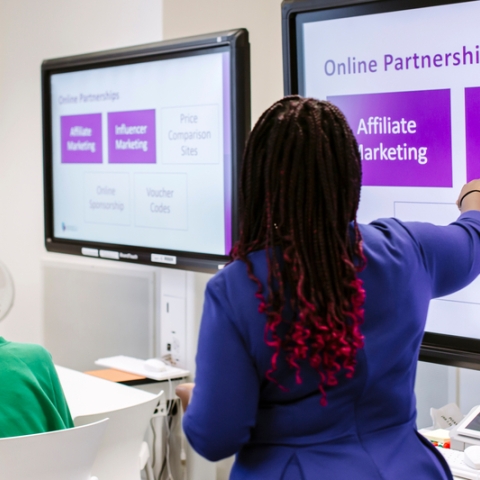
Business Simulation Suite
Experience the boardroom in our replica business suite.

Careers and opportunities
As a human resource manager you can work in any sector that you're passionate about, whether that's sport, charities, manufacturing, or maybe the arts; all sorts of different businesses need effective workforce management. It's also a role that could take you overseas.
Best of all is that this qualification opens up many possible career routes. You might want to specialise in workplace training and development, become an expert in employment law, or lead on business development. As you progress you'll be able to map a career to your interests.
Your CIPD accreditation means you're likely to earn more money and have more job options than your non-accredited peers (Reed UK). CIPD Associate membership is highly-valued by employers and it therefore provides a valuable employability advantage when looking for your first job. Please note membership is subject to the payment of a membership fee.
Previous graduates of this course have secured jobs at companies such as:
- Peninsula Group Ltd HR Consultancy
- Santander
- Ministry of Defence
- Aldingbourne Trust
- JRL Construction
- Wartsila (Marine and Energy) UK Ltd
- Henkel
- UK Atomic Energy Authority
- Finsbury Foods
Graduates of this course have secured jobs as:
- HR executive
- learning and development coordinator
- human resources business partner
- HR and employment law consultant
- internal auditor
- project manager
- police officer
- buyer
(Data sourced from HESA Graduate Outcomes Survey.)
Careers and employment
Our graduate employment rates are among the UK's best, with 94% of our students in work and/or further study.


Business Consultancy Project
Work for a client on a real brief in this optional Business Consultancy module.
Students work in teams of 3-4 to bid for a business project from local organisations, before working directly with the organisation to execute the project.
Clients range from small to medium sized organisations who could be from the private, public or third sector (such as charities, not-for-profits and community organisations).
Each project is different, but the tasks you compete could include:
- Using marketing theory to develop social media strategies
- Conducting competitor analysis
- Drafting sustainable business plans based on the UN's Sustainable Development Goals
- Conducting staff interviews
- Evaluating customer feedback
You’ll give your client regular updates on the project, and get feedback from them, other students and staff as you progress.
Past students have worked with Santander, local facilities management firm Inovolt, the Instant Kitchen Company startup, Solent Recovery College, and local radio station Express FM.
At the end of your project, you'll be invited to a celebratory event where you can network with representatives from the client organisations.
You could also choose to continue your studies at postgraduate level, or set up your own business with help and support from the University.

Why study Business and Human Resource Management?
Discover why studying Business and Human Resource Management will give you a head start in your career.
Read the blog
Work placement year
You can boost your employability by taking an optional paid placement after your second or third year of study.
Previous students on this course have had placements in organisations such as:
- IBM
- Samsung
Many of our students are offered graduate jobs by their placement employers.
The average salary for a 12-month paid placement is £19,800 for students in the Faculty of Business and Law. It could be more or less than this amount depending on your placement. You'll only pay a very small percentage of your tuition fee for this year.
You could also set up your own business, or take a voluntary placement.
Sarah's story
Sarah graduated in 2019 with a degree in BA (Hons) Business and Human Resource Management. She is now Transformation Workstream Lead at the Cabinet Office. Discover how Sarah benefited from a placement year at IBM and how she’s applying the skills she learned during her time at Portsmouth.
Before I started uni I didn't really know what I wanted to do. When I was speaking to people when I was applying for uni, they were like actually you're really good with people, have you thought about HR?
I wanted to do something that I was passionate about, and I thought I am passionate about working with people, and I'm going to enjoy it.
During my time at University I did a placement year at IBM. It was putting what I'd learned into practice, and actually made it kind of make sense. That was my light bulb moment where I was like, this is the career for me.
The biggest impact the University of Portsmouth has had on me is personal growth in myself. I learned so much while I was there.
I did access the Careers and Employability Service. They helped me to look at CVs and interviews, they're so helpful and so beneficial.
Once I graduated I got a job on the Civil Service File Streams — it's the Times number one graduate program. I'm actually working on reforming The Graduate scheme I'm on.
What I'm doing, I feel like it really does make a difference.
And being in the cabinet office is the centre of government so it does have that wider impact.
The advice I give people at the start of their career if they're not really sure what they want to do, is just see what you're passionate about, see what you enjoy doing — it can really take you anywhere.
It's quite amazing, sometimes I have to pinch myself. I'm here doing this and I've come a long way.
The University of Portsmouth really has kind of changed my life.
Hear from our placement students
Ways to enrich your study
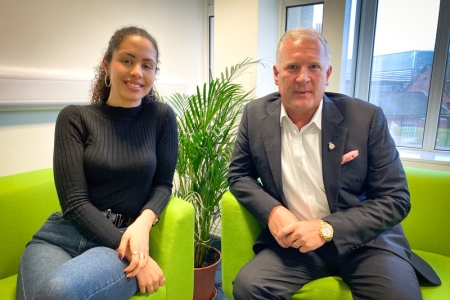
Entrepreneurs in Residence Programme (EiR)
We have over 20 experienced business entrepreneurs on our free EiR programme who can help you develop your business idea.
"I have a business idea, but I was not too sure about it. After this meeting, I felt so encouraged and positive about it! I felt so motivated to pursue my business venture. He gave me real life advice and helped me how to approach my ideas."
Rabab El Habchi Mahir meeting EiR Mark Smith

Study abroad year
Between your second and third year, you can choose to study abroad at one of our partner universities in Europe, Asia, Australia or North America. All classes are delivered in English and you'll still be able to get both your tuition fee and maintenance loans. You may also qualify for a government travel grant.
"Students that go abroad are more likely to obtain first-class honours [and] more likely to be in graduate employment than their non-mobile peers."
Universities UK International: 'Gone International, Rising Aspirations', 2019
Modules
Each module on this course is worth a certain number of credits.
In each year, you need to study modules worth a total of 120 credits. For example, 4 modules worth 20 credits and 1 module worth 40 credits.
What you'll study
Foundation year
If you're not sure you meet the entry requirements, or need some help to get uni-ready, then we offer this course with a foundation year to bring you up to speed.
- You'll study on the University of Portsmouth campus with access to all facilities, support and societies
- When you finish your foundation year successfully, you get a guaranteed place on BA (Hons) Business and Human Resource Management
- Get used to how lectures, seminars and tutorials work, so you can move on to your degree ready for success
- Learn how to meet the demands of taking on a bachelor's degree at university
Explore BA (Hons) Business and Human Resource Management with Foundation Year
Core modules
Through lectures, seminars, and hands-on computer labs, you'll analyse data and interpret results with tools such as Excel.
By the end of this module you'll be able to demonstrate descriptive, predictive and prescriptive analytics and communicate insights to various audiences.
This practical experience equips you with valuable analytics and communication abilities that are sought-after in the world of business.
Core modules
Optional modules
Core modules
It requires critical engagement with appropriate literature, sound choice of research methods and carrying the planned approach into practice to produce a piece of independent research.
Students will be supported through a mix of large group sessions, workshops and individual appointments to support them to develop a research idea and to realise it as a piece of written work. Individual appointments will be arranged between supervisor and student.
Optional modules
The Module makes use of case examples to review applicable theory and frameworks to illustrate the combined roles of Continuous Improvement (CI), Organisational Learning (OL), Change Management, and the importance of a Creative Environment (CE) as a springboard for innovation. This module will develop your knowledge and understanding in the application of ideas, methodologies, processes, and techniques for improving and sustaining organisational performance. The module emphasises the operationalising of business and functional strategy and focuses on how to facilitate and sustain successful change. The module evaluates the cultural, behavioural and human elements, and considers the role people have in leading and being part of successful and sustainable improvement.
You'll spend your working industry, with support from our Placement Office.
You'll complete a placement portfolio for the duration of the placement, which will outline your key learning activities, and attend a Placement Student Day at the University to discuss your placement experience with the Placement Officer or your course leader.
When you successfully complete your placement it will be recognised in your degree transcript of achievement, and your degree certificate will state `in the sandwich mode'.
You may also choose to receive a Certificate of Professional Practice from the Faculty of Business and Law.
Changes to course content
We use the best and most current research and professional practice alongside feedback from our students to make sure course content is relevant to your future career or further studies.
Therefore, some course content may change over time to reflect changes in the discipline or industry. If a module doesn't run, we'll let you know as soon as possible and help you choose an alternative module.
Teaching
Portsmouth Business School is ranked 3rd in the UK for teaching power. You'll be taught by a dedicated team of specialist staff that includes a great mix of research expertise and industry experience.
Around 20% of your timetabled teaching will be online. The majority of your timetabled teaching will be face-to-face and will include:
- lectures
- seminars
- tutorials
- workshops
- practical sessions
- group discussions
We pride ourselves on the academic support we offer our students. In addition to our dedicated teaching team, you'll have a personal tutor, student engagement officers and study support staff to help you throughout your studies.
Assessment
We use a diverse range of assessments and we focus on the types of work you'll be expected to complete in the workplace.
Assessment methods are likely to include:
- individual and group coursework
- examinations
- online activities
- presentations
- your choice of independent research

My favourite thing about my degree is my course leaders.....They make the university experience at Portsmouth an absolute joy to be a part of as well as offering me fantastic chances across my 3 years to develop myself and my HR abilities!
How you'll spend your time
One of the main differences between school or college and university is how much control you have over your learning.
We use a blended learning approach to teaching, which means you’ll take part in both face-to-face and online activities during your studies. As well as attending your timetabled classes you'll study independently in your free time, supported by staff and our virtual learning environment, Moodle.
A typical week
We recommend you spend at least 35 hours a week studying for this degree.
In your first year this is what your week may look like:
- timetabled teaching activities (lectures, seminars, tutorials, classes and workshops) = about 14 hours a week
- independent study (research, reading, coursework and project work, alone or in a group) = about 21 hours a week
You'll probably do more independent study and have less scheduled teaching in years 2 and 3, but this depends on which modules you choose.
Term dates
The academic year runs from September to June. There are breaks at Christmas and Easter.
Supporting you
The amount of timetabled teaching you'll get on your degree might be less than what you're used to at school or college, but you'll also get support via video, phone and face-to-face from teaching and support staff to enhance your learning experience and help you succeed. You can build your personalised network of support from the following people and services:
Types of support
Your personal tutor helps you make the transition to independent study and gives you academic and personal support throughout your time at university.
You'll have regular scheduled meetings with your personal tutor. They're also available by appointment if you want to chat with them about anything that can't wait until your next meeting.
In addition to the support you get from your personal tutor, you'll also have access to our student engagement officers. They can give you confidential, impartial advice on anything to do with your studies and personal wellbeing, and refer you to specialist support services if you need extra help or support.
You'll have help from a team of study support tutors. Based within the Faculty of Business and Law, these tutors are familiar with the specific requirements your assignments and work closely with faculty academics. This means they can give you focused support with the specific study skills you need to be successful on your course. They're available face-to-face, by phone, email, and by video call.
They can help with:
- Academic writing (for example, essays, reports, dissertations, projects and literature reviews)
- Reflective writing skills
- Critical thinking skills
- Delivering presentations (including observing and filming presentations)
- Understanding and using assignment feedback
- Managing your time and workload
- Revision and exam techniques
If you're a mature student, specialist support to help you return to learning is available.
As well as support from faculty staff and your personal tutor, you can use the University's Academic Skills Unit (ASK).
ASK provides one-to-one support in areas such as:
- Academic writing
- Note taking
- Time management
- Critical thinking
- Presentation skills
- Referencing
- Working in groups
- Revision, memory and exam techniques
Library staff are available in person or by email, phone, or online chat to help you make the most of the University's library resources. You can also request one-to-one appointments and get support from librarians who specialise in business and law.
The library is open 24 hours a day, every day, in term time.
Our online Learning Well mini-course will help you plan for managing the challenges of learning and student life, so you can fulfil your potential and have a great student experience.
You can get personal, emotional and mental health support from our Student Wellbeing Service, in person and online. This includes 1–2–1 support as well as courses and workshops that help you better manage stress, anxiety or depression.
If you require extra support because of a disability or additional learning need our specialist team can help you.
They'll help you to
- discuss and agree on reasonable adjustments
- liaise with other University services and facilities, such as the library
- access specialist study skills and strategies tutors, and assistive technology tutors, on a 1-to-1 basis or in groups
- liaise with external services
If English isn't your first language, you can do one of our English language courses to improve your written and spoken English language skills before starting your degree. Once you're here, you can take part in our free In-Sessional English (ISE) programme to improve your English further.
Course costs and funding
Tuition fees
- UK/Channel Islands and Isle of Man students – £9,250 per year (may be subject to annual increase)
- EU students – £9,250 (including Transition Scholarship – may be subject to annual increase)
- International (non-EU) students – £17,200 per year (subject to annual increase)
- UK/Channel Islands and Isle of Man students – £9,250 per year (may be subject to annual increase)
- EU students – £9,250 (including Transition Scholarship – may be subject to annual increase)
- International (non-EU) students – £17,200 per year (subject to annual increase)
Funding your studies
Find out how to fund your studies, including the scholarships and bursaries you could get. You can also find more about tuition fees and living costs, including what your tuition fees cover.
Applying from outside the UK? Find out about funding options for international students.
Tuition fees terms and conditions
Additional course costs
These course-related costs aren’t included in the tuition fees. So you’ll need to budget for them when you plan your spending.
Additional costs
Our accommodation section shows your accommodation options and highlights how much it costs to live in Portsmouth.
You’ll study up to 6 units a year. You may have to read several recommended books or textbooks for each unit.
You can borrow most of these from the Library. If you buy these, they may cost up to £60 each.
We recommend that you budget £75 a year for photocopying, memory sticks, DVDs and CDs, printing charges, binding and specialist printing.
If your final year includes a major project, there could be cost for transport or accommodation related to your research activities. The amount will depend on the project you choose.
If you take a placement year or study abroad year, tuition fees for that year are as follows:
- UK/Channel Islands and Isle of Man students – £1,385 a year (may be subject to annual increase)
- EU students – £1,385 a year, including Transition Scholarship (may be subject to annual increase)
- International students – £2,875 a year (subject to annual increase)
How to apply
Apply now through Clearing
If you have your results, you can apply directly to us now to start in September 2024.
Applying for year 2 or 3
If you've already completed part of this course with us or another university and would like to apply for the second or third year with us in September 2024, use our online application form.
September 2025 applications
To start this course in 2025, apply through UCAS. You'll need:
- the UCAS course code – NN16
- our institution code – P80
If you'd prefer to apply directly, use our online application form.
You can also sign up to an Open Day to:
- Tour our campus, facilities and halls of residence
- Speak with lecturers and chat with our students
- Get information about where to live, how to fund your studies and which clubs and societies to join
If you're new to the application process, read our guide on applying for an undergraduate course.
Looking for this course with a foundation year?
Take a look at BA (Hons) Business and Human Resource Management with Foundation Year
How to apply from outside the UK
See the 'How to apply' section above for details of how to apply. You can also get an agent to help with your application. Check your country page for details of agents in your region.
To find out what to include in your application, head to the how to apply page of our international students section.
If you don't meet the English language requirements for this course yet, you can achieve the level you need by successfully completing a pre-sessional English programme before you start your course.
Admissions terms and conditions
When you accept an offer to study at the University of Portsmouth, you also agree to abide by our Student Contract (which includes the University's relevant policies, rules and regulations). You should read and consider these before you apply.


